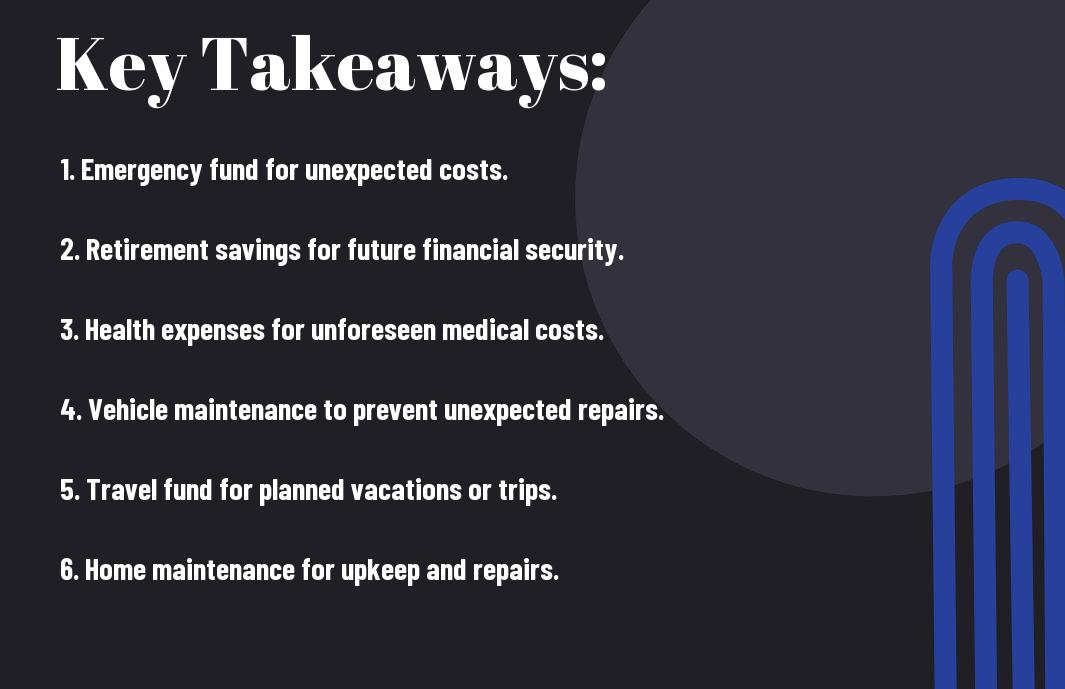Planning for your financial future is crucial, and a key aspect of this is having a savings plan in place. To effectively save for your needs and goals, it’s important to identify and prioritize certain types of expenses. By planning and saving for specific expenses, you can better manage your finances, achieve your financial objectives, and secure your financial well-being. Let’s explore the important expenses that warrant a place in your savings plan.
Table of Contents
Key Takeaways:
- Emergency Expenses: It is crucial to have a savings plan in place for unexpected events such as medical emergencies, car repairs, or sudden job loss.
- Large Expenses: Save for significant expenses like buying a house, car, or funding education to avoid relying on loans and accumulating debt.
- Retirement: Planning for retirement early on is necessary to ensure financial security in later years. Setting aside funds for retirement through savings or investments is a wise decision.


Essential Living Expenses
If you are looking to create a savings plan, it is important to first identify your important living expenses. These are the costs that are necessary for your day-to-day living and should be prioritized in your budget. One popular budgeting method that can help you allocate your funds is the What is the 50/30/20 budget rule, and is it right for you?
Housing and Utilities
An important expense that should be included in your savings plan is housing and utilities. This category includes your rent or mortgage payment, as well as expenses like electricity, water, heat, and internet. It is crucial to prioritize these costs to ensure you have a safe and comfortable living environment. Consider creating a separate fund specifically for housing expenses to avoid any financial strain.
When budgeting for housing and utilities, it is important to factor in any potential increases in expenses, such as rent hikes or higher energy costs. Planning ahead for these fluctuations can help you avoid any financial surprises and ensure that you are able to cover these important expenses each month.
Food and Groceries
To maintain a healthy lifestyle, budgeting for food and groceries is important. This includes the cost of groceries for meals at home, as well as any dining out expenses. Setting aside a specific amount for food each month can help you avoid overspending and ensure that you are meeting your nutritional needs. Be mindful of planning your meals and grocery shopping to make the most of your budget.
Any extra funds left over from your food and groceries budget can be allocated towards other savings goals or used for special occasions like dining out at a restaurant. It is important to strike a balance between enjoying meals outside the home and sticking to your budget to ensure financial stability in the long run.
Health and Emergency Fund
Keep a close eye on your health and be prepared for unexpected situations by including medical and emergency expenses in your savings plan. Having a separate fund for health-related costs can provide peace of mind and financial security when faced with unforeseen medical or dental emergencies.
Medical and Dental Care
One of the vital expenses to include in your savings plan is medical and dental care. Regular check-ups, treatments, and unexpected medical emergencies can be costly. By setting aside a portion of your budget for healthcare expenses, you can ensure that you are prepared for any unforeseen medical or dental costs that may arise.
Additionally, investing in health insurance can help cover a significant portion of your medical expenses, reducing the financial burden on you and your savings. Remember that prevention is better than cure, so allocating funds for routine check-ups and preventive care can help you maintain good health and avoid costly medical procedures in the long run.
Emergency Situations
Situations like job loss, car repairs, or home maintenance issues can arise unexpectedly, putting a strain on your finances. It is vital to have an emergency fund set aside to cover these unforeseen expenses without having to dip into your savings or rely on credit cards.
To build your emergency fund, aim to save at least three to six months’ worth of expenses. This cushion can provide you with financial stability during challenging times and prevent you from going into debt to cover unexpected costs. Keep in mind, emergencies can happen at any time, so being prepared is key to maintaining your financial well-being.
Long-Term Financial Goals
To secure a stable financial future, it is imperative to include long-term financial goals in your savings plan. These goals typically involve major life events or milestones that may be years or even decades away. By planning and saving for these goals early on, you can ensure that you are financially prepared for whatever the future may hold.
Retirement Savings
For long-term financial security, saving for retirement is crucial. It is never too early to start setting aside funds for your retirement years, as the earlier you begin, the more time your money has to grow through compounding interest. Consider contributing to retirement accounts such as a 401(k) or an Individual Retirement Account (IRA) to ensure a comfortable retirement lifestyle.
Calculate how much you will need for retirement based on your projected expenses and lifestyle choices. Use online calculators or consult with a financial advisor to determine a savings goal that aligns with your retirement plans. Make regular contributions to your retirement accounts and monitor their performance to make adjustments as needed.
Education and Career Development
The pursuit of higher education and career advancement often requires a significant financial investment. Saving for education can include setting aside funds for college tuition, specialized training programs, or professional certifications. By planning ahead for these expenses, you can avoid taking on excessive student loan debt and make strategic decisions that benefit your long-term career growth.
The value of investing in education and career development cannot be overstated. Not only can it lead to increased earning potential, but it can also open doors to new opportunities and career pathways. Consider creating a separate savings fund specifically designated for educational expenses to ensure that you are prepared for any learning or training opportunities that may arise.
This proactive approach to education and career development can empower you to take control of your professional growth and financial future. By prioritizing savings for education and skill advancement, you are investing in yourself and laying the groundwork for long-term success. Remember that continual learning and development are key components of building a fulfilling and sustainable career.
Lifestyle and Discretionary Spending
Nowadays, it’s easy to get caught up in the whirlwind of our daily lives and forget to plan for the fun things. However, it is equally important to budget and save for lifestyle and discretionary spending. By creating a savings plan for these expenses, you can indulge in the things you enjoy without feeling guilty about it.
Vacations and Travel
Vacations are vital for rejuvenating the mind and body, but they can also put a strain on your finances if not planned for properly. Creating a separate savings fund for vacations and travel can help alleviate the financial burden of these trips. By setting aside a portion of your income regularly, you can ensure that you have the funds necessary to explore new destinations and create lasting memories with your loved ones.
Plus, having a dedicated savings plan for vacations allows you to take advantage of travel deals and discounts, as you will have the funds readily available when an irresistible opportunity arises. Whether you dream of a luxurious beach getaway or a thrilling adventure in a foreign land, having a financial plan in place will make your travel aspirations more attainable.
Entertainment and Leisure
Leisure activities are an important part of a healthy work-life balance, but they often come with a price tag. Whether it’s dining out at your favorite restaurant, attending concerts or sporting events, or simply enjoying a day at the spa, these activities add value to your life. Planning and budgeting for entertainment and leisure expenses can prevent overspending and ensure that you can continue to enjoy these activities guilt-free.
By allocating a portion of your budget to entertainment and leisure, you can prioritize your spending based on what brings you joy and fulfillment. Whether it’s a monthly movie night with friends or an annual music festival, having a savings plan in place allows you to indulge in these experiences without straining your finances.
Conclusion
So, it is crucial to make a savings plan for all types of expenses that are both expected and unexpected. By setting aside funds for emergencies, healthcare costs, home maintenance, car repairs, vacations, and retirement, you can ensure financial stability and peace of mind. Planning ahead allows you to manage your expenses effectively and avoid financial strain in the future. Recall, it is never too early to start saving for the long term and unexpected expenses that may arise.
FAQ
Q: Why is it important to make a savings plan for specific expenses?
A: It is important to make a savings plan for specific expenses to ensure that you have the funds available when those expenses arise. By planning ahead, you can avoid financial stress and uncertainty.
Q: What types of expenses should you include in your savings plan?
A: You should include both expected and unexpected expenses in your savings plan. This can include regular bills, such as rent or mortgage payments, as well as emergency expenses, such as medical bills or car repairs.
Q: How can you determine how much to save for each expense?
A: To determine how much to save for each expense, start by tracking your spending and creating a budget. Once you have a clear understanding of your expenses, you can allocate a specific amount of your income to each category. It is also a good idea to build an emergency fund to cover unexpected costs.
 AIRMAX BLOG Portal Berita Terbaru AIRMAX BLOG
AIRMAX BLOG Portal Berita Terbaru AIRMAX BLOG


